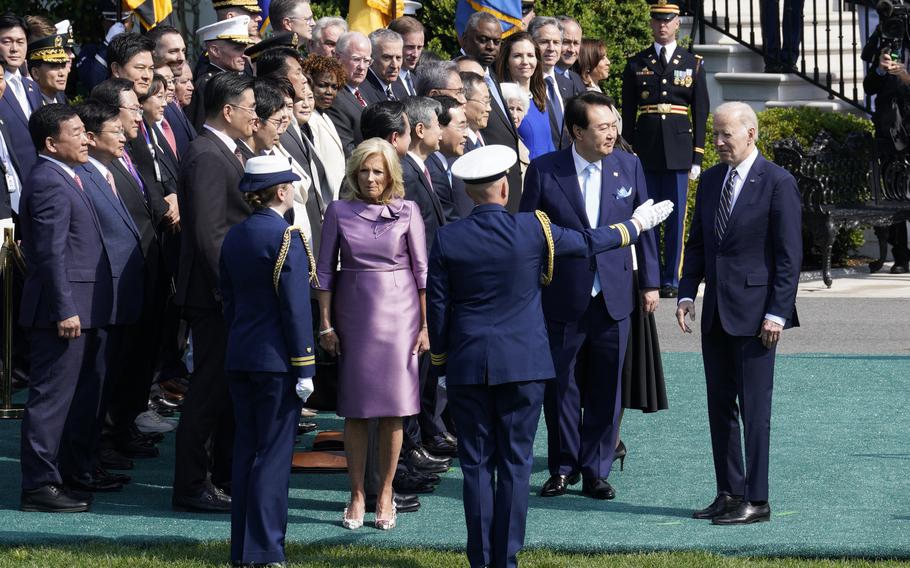
U.S. President Joe Biden greets South Korean President Yoon Suk Yeol for the Official Arrival Ceremony on the South Lawn of the White House in Washington, D.C. on Wednesday, April 26, 2023. (Yuri Gripas, Abaca Press/TNS)
President Yoon Suk Yeol of South Korea recently completed a six-day visit to Washington. The relatively lengthy visit by the head of government underscores both the international influence of his nation and the high priority of the alliance with the United States.
The visit marked the 70th anniversary of the vital alliance between South Korea and the United States.
This was the second summit, and fifth meeting in total, between President Joe Biden and Yoon in less than a year. The packed itinerary included an address to a joint session of Congress, a visit to the Goddard Space Center of NASA, an important stop at the Pentagon, an assembly of South Korean and U.S. business representatives hosted by the U.S. Chamber of Commerce, and a state dinner at the White House.
The long-term increase in tensions with the surviving communist regime in North Korea, which includes Pyongyang’s expanding nuclear weapons program, adds significance to the visit and the relationship.
As recently as the early 1960s, South Korea was one of the poorest economies in the world. Still a peasant society, the entire Korean Peninsula was terribly devastated by the Korean War of 1950-53. Yet today, the Republic of Korea ranks among the top 20 economies in the world, holding leadership roles in the automobile, advanced electronics, shipbuilding and other industries.
Rapid industrialization and economic modernization have been complemented by striking transition from dictatorship to democracy. President and Gen. Park Chung-hee stifled incipient democracy and imposed extremely harsh military authoritarianism for nearly two decades. He was assassinated in 1979 by the head of the KCIA, the national intelligence agency. In Korean memory, he remains a respected symbol of strength and effectiveness for many, though with progress and the passage of time that fades.
Park was succeeded as chief executive by two more generals, Chun Doo Hwan and Roe Tae Woo, but growing pressure for true democratic representation proved insurmountable.
The capstone of transition to democracy was the election of Kim Dae-jung as president in 1998. He completed his five-year term without interruption, and in 2000 received the Nobel Peace Prize.
A public symbol of opposition to Park dictatorship, he was imprisoned for several years. On another occasion, KCIA agents kidnapped him and planned to kill him. Only the intervention of senior U.S. CIA official Don Gregg saved his life.
South Korea’s remarkable domestic accomplishments have unfolded while the country becomes increasingly influential in global arenas. In 2012, the Obama administration shrewdly nominated President Jim Yong Kim of Dartmouth College, who was born in Seoul, South Korea, as president of the World Bank.
The original vision of the United Nations combined competing goals of favoring the most powerful nations and inclusive global representation. Kim and former U.N. Secretary-General Ban Ki-moon personify South Korea’s significant expanding role as a bridge between developed and developing nations.
Market economies and reasonably representative governments now characterize a steadily increasing share of the world’s developing nations. In short, South Korea is positioned to lead developing nations toward prosperity.
The United Nations today is strong. U.N. and U.S. decisions in 1950 to defend South Korea were vital to this success. During the long Vietnam War, South Korea maintained approximately 50,000 troops in South Vietnam. They were overwhelmingly combat forces. The principal incentive was loyalty to the United States forged during the Korean War.
Yoon has the opportunity to develop a starring global leadership role, with noisy North Korea shunted off to stage left. At the state dinner, he sang lines from Don McLean’s 1971 song “American Pie.”
Arthur I. Cyr is the author of “After the Cold War — American Foreign Policy, Europe and Asia.”